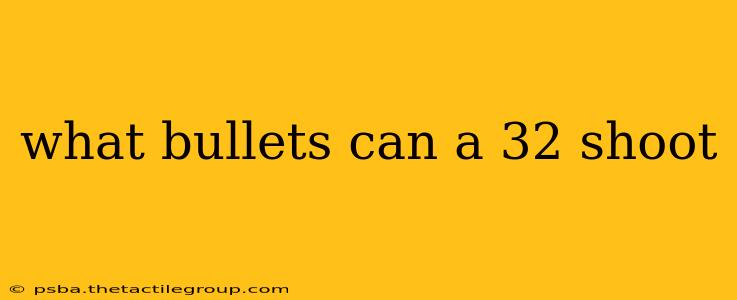What Bullets Can a .32 Caliber Firearm Shoot?
The .32 caliber is a relatively common cartridge, but it's crucial to understand that there are several different .32 cartridges, and they are not interchangeable. Using the wrong ammunition in a firearm can lead to serious injury or death. Therefore, always double-check your firearm's markings to determine the correct ammunition type before loading.
Here's a breakdown of some common .32 caliber cartridges:
Common .32 Caliber Cartridges:
-
.32 ACP (Automatic Colt Pistol): This is a relatively common semi-automatic pistol cartridge. It's known for its moderate power and relatively low recoil, making it suitable for concealed carry and target shooting.
-
.32 S&W Long: A slightly longer and more powerful round than the .32 S&W, this cartridge is used in revolvers. It offers more stopping power than the shorter .32 S&W.
-
.32 S&W (Short): This is a relatively weak cartridge, primarily found in older revolvers. Its low power and small size limit its effectiveness for self-defense.
-
.32 H&R Magnum: This cartridge is a more powerful option compared to the other .32 cartridges listed above. It offers significantly increased stopping power, often preferred in self-defense situations.
Identifying Your Firearm's Cartridge:
The markings on your firearm are vital to safe and correct ammunition selection. Look for these areas:
-
The barrel: The caliber will usually be stamped directly on the barrel of the gun. It might be written as ".32 ACP," ".32 S&W Long," or similar.
-
The slide (for semi-automatic pistols): The cartridge type is frequently stamped on the slide of the firearm.
-
The cylinder (for revolvers): The cylinder might have markings indicating the correct cartridge type.
-
The firearm's manual: Your firearm's manual should clearly state the type of ammunition it's designed to fire.
Important Safety Considerations:
-
Never use ammunition that is not explicitly stated in the firearm's manual.
-
Inspect your ammunition before loading. Look for any signs of damage, such as dents or corrosion.
-
Always store your ammunition securely and out of reach of children.
-
If you are unsure about which ammunition to use, consult a qualified firearms expert or gunsmith.
This information is for educational purposes only and should not be considered a substitute for professional guidance. Safe firearm handling requires thorough knowledge and practice. Always prioritize safety and consult with qualified professionals for any questions regarding firearm operation and ammunition selection.

